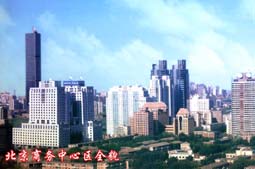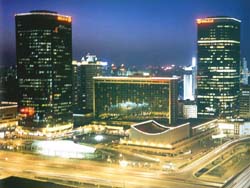Most major cities in the world have a Central Business District, or CBD. This special area with loosely defined geographic boundaries has been generally acknowledged as an "engine room" to the development of local and even global economies. However, the concept of CBD that began in the United States and has several decades of history is now being challenged. Can it still survive the current world economic climate? Can it be adopted in developing countries like China? In today's Business Life, we will show you how the so-called "Oriental Manhattan"—the embryonic Beijing CBD, is operating, and how some other major Chinese cities are gearing up for creating their own business districts.
This is not Manhattan of New York, neither is this Central of Hong Kong, nor La Defence of Paris. It is the Central Business District of Beijing, capital of China. In the early 1990s, the Beijing Municipal Government took the lead in proposing to set up a CBD in China. Top officials hoped that this special district could play the role of a key financial and commercial contributor for the whole country's advancement.
Qiu Shuiping, Chief Director of Beijing CBD Administrative Commission, said: "One of the growth areas that are suitable for exploration and development in Beijing is the service industry. The locomotive of this industry is the financial sector. Therefore, Beijing decided to set up the CBD in Chaoyang District for financial, commercial and trade service agencies, allowing for highly profitable and productive business activities. It will add momentum to the development of the service industry of Beijing and China as a whole."
 After almost a decade of planning and development, a burgeoning CBD is taking shape in the capital city, making it one of the most dynamic business locations in China.
After almost a decade of planning and development, a burgeoning CBD is taking shape in the capital city, making it one of the most dynamic business locations in China.
In its current phase, Beijing CBD is now home to more than two thousand enterprises, one-third being foreign-funded. Of those 180 companies on Fortune's top 500 who have based their China operations in Beijing, over two-thirds operate from the CBD and its surrounding areas. Among all the entities in the area, players from the financial sector are most preferred.
Qiu Shuiping also said that we leave a core area of some 30 hectares in the district for new investors especially those from the financial sector. Only with financial institutions and companies being the locomotive of Beijing CBD, can this central district play an important role in Beijing's development and exert significant influence on the world market.
According to the general construction plan for the Beijing CBD, office buildings will account for half of the total space, while apartments will account for a quarter and the remaining quarter will be used for shopping, services, culture and entertainment. Greenery will amount to about 11 per cent of the whole area that covers roughly four square kilometers. Experts say, in the coming few years, hundreds of billions of RMB will be poured into the area.
However, while Beijing CBD steps forward to be the heart of a modern international metropolis, some difficulties have reared their heads. One of the stumbling blocks is the lack of advanced management.
In order to bring together the insights and experience of other metropolises, in this September, Beijing CBD organized a forum and invited some 50 foreign experts, city mayors and CEOs to give speeches on the development of CBDs in their own countries and to make suggestions to their Chinese counterparts.
Among those distinguished advisors is Mrs. Petra Roth, mayor of Frankfurt, Germany, she said: "Western CBDs are well established, and you're starting, but this is not a disadvantage, it could be a great advantage, you can avoid all the mistakes we have done in the past. This congress shows how interesting, how modern and how open the Chinese market is and the China's state is now to open itself into finance and business market all of the world."
At the forum, you could hear buzz words such as opportunity, modernity and dynamism. However, you could also see concerned expressions on the participants' faces.
 As a senior urban planner for Chicago which claims to have one of the most lively and successful central districts in the world, Mr. Benet Haller gave his opinion on the Beijing CBD's construction scheme.
As a senior urban planner for Chicago which claims to have one of the most lively and successful central districts in the world, Mr. Benet Haller gave his opinion on the Beijing CBD's construction scheme.
Benet Haller, Project Manager of Department of Planning and Development, said: "One of the downside things I have seen in the plan that currently exists is that there are a series of office buildings on a very large field. There are not a lot of things going on, that seems to me that what happens on the ground level is an exciting streetscape. There is retail, there are people hanging out into the night, a 24-hour vibrant central district, I think it's a crucial aspect of any central business district. And I wonder what the scheme will develop, what is going to happen on the ground level, because it looks to me it is relatively empty."
"To me it's not what a central business is all about. It is about density, it's about having a ground level that's very active."
Mr. Haller's critical eye is not merely put on where the Beijing CBD needs to improve, he also notes the potential of Beijing's market and advises the city planners to adjust the scheme.
Benet Haller, Project Manager of Department of Planning and Development, said: "We all recognize that if you want to be active in the world economy, you have to invest in China, you have to invest in Beijing. You are going to make use of buildings, to make hotels, offices, all things together, and allowing sort of things to happen, and not being set on one specific design. I think it's very important."
Foreign experts attending the forum not only offered constructive suggestions, but also help the Chinese senior planners to seek innovative ideas on operations and to rethink their development strategies.
Chen Dongqi, Director of Institute of Economics of State Development Planning Commission, said: "The construction of a central business district is no longer for only one purpose—to yield more economic profits. Due to the large density of people working in the area, we have to create a more preferred and comfortable environment for people here. That's one of the key issues that the CBD planners should take into consideration."
Compared with other business districts in world's well-known cities like Chicago, New York, Paris and China's Hong Kong SAR, Beijing CBD is still young and inexperienced.
However, with China's economy on the rise year after year, Beijing CBD, as one of the showcases of the entire nation's development, its potential and prospects have long been acknowledged by companies both from home and overseas.
New skyscrapers and other buildings in the CBD are on the way, of course, thanks to local zeal and multibillion-dollar investments by developers.
Outstanding among the first batch of the key real estate projects is the Fortune Plaza, which is aiming to be at the heart of the district. It will be a commercial complex combining office buildings, apartments, hotel and stores. Like many other real estate companies, the plaza's developers show their satisfaction with the area's investment environment.
Yu Judith, Finance Director of H.K.I. Development Company said that the investment environment is getting mutual through the years. It attracts many multinational coming over to Beijing. With Olympics and WTO, I think, many foreign companies are seeing the importance and potential in China, and Beijing, being the capital of China, especially the CBD, is attracting so many multinational companies and embassies. From this, we can see they have placed a lot of importance to develop this area.
Aside from the real estate sector, investors have also shifted their sights to other lucrative areas in the CBD.
NTT Data is Japan's largest IT base equipment provider. Currently, NTT is seeking further cooperation with Beijing CBD.
Teruyoshi Kawai, Senior Advisor of NTT Data Corporation, said: "I have been to Beijing thirty times since 1994. There are few cities like Beijing in the world that develops so rapidly. More and more companies have shifted their sights to China. The ever fiercer competition is an indicator that the market is receiving a great deal of attention from all over the world."
A joint survey conducted by the Beijing CBD Administration Commission and the National Bureau of Statistics shows that 60 percent of the sampled CBD-based enterprises consider the area's further development to be a wise move, while the majority of corporate CBD tenants are confident that more opportunities and better services will ensue.
Jonathan Woetzel, Board Director of McKinsey&Company, said: "Beijing has great opportunities with the Olympics, the tremendous wealth and historical landmarks here, dynamic hi-tech and industrial and financial sector. I predict Beijing will have one of the world's greatest CBDs in ten years from now."
Needless to say, Beijing CBD enjoys advantages such as easy access to large multinational companies and convenient communication between investors and China's top policy-makers.
Now more and more Chinese cities such as Shanghai and Guangzhou are seeing Beijing as a model and gearing up for their own CBD's construction. However, some experts have raised warnings on this CBD trend.
Chen Dongqi, Director of Institute of Economics of State Development Planning Commission said: "Instead of following suit blindly, those Chinese cities who want to set up CBDs should first take comprehensive and objective self-analyses in terms of the local economy, cultural background, market demands and prospects to see if it's appropriate to construct a CBD. This is also a key issue that China's urban planners and policy-makers should carefully consider before they make up their minds."
The heated discussion on how to construct CBDs in China is still going on. Learning from other established models is a short-cut. Despite the magnitude of the work ahead, there is no way for Beijing to step back. A successful CBD in China is expected to serve as an important landmark and the most powerful magnet to attract investment from all over the world.
Source: CCTV-9 China Business Guide
Editor: Zhao Xuan
|